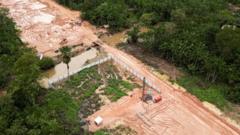The construction of a four-lane highway through the Amazon rainforest has sparked outrage among local communities and environmental advocates as Brazil gears up to host the COP30 climate summit in Belém this November. Promoted by the state government as a "sustainable" initiative intended to improve traffic flow for the anticipated influx of over 50,000 participants, critics argue it severely undermines the efforts to combat climate change, given the ecological importance of the rainforest.
With over 13 kilometers (8 miles) of protected rainforest being cleared, the highway's surroundings starkly contrast the lush greenery that once thrived there. Local resident Claudio Verequete, whose livelihood depended on harvesting açaí berries, has found his income obliterated as his community’s resources vanish without any form of compensation. He voices concerns about the long-term repercussions, fearing increased accessibility could draw more businesses and lead to further deforestation.
The construction not only disrupts local economies but also fragments critical wildlife habitats. Wildlife rehabilitation expert Prof. Silvia Sardinha warns that the resulting barriers will hinder animal movement and reduce viable habitats for breeding. She believes the intersection of scientific knowledge and local experience is overlooked in the larger dialogues surrounding forestry conservation.
Brazil's leadership has framed the summit as a pivotal moment for showcasing its commitment to Amazonian issues. However, many locals feel excluded from the discussions, which seem to prioritize infrastructure and development over sustainable practices. Despite previous plans for the avenue being shelved due to environmental concerns, the state has revived multiple infrastructure projects geared towards COP30, including further development of city facilities, hotels, and expanded airport capacity.
While some local business owners see potential opportunities in increased tourism and improved city infrastructure, others remain skeptical about the environmental integrity of such developments. They are calling for tangible actions and meaningful policies from world leaders rather than promises that could easily turn into platitudes.
As international scrutiny mounts over the environmental cost of hosting a climate summit, the situation in Belém serves as a glaring reminder of the clash between developmental ambitions and the urgent need for ecological stewardship in the heart of the Amazon.
With over 13 kilometers (8 miles) of protected rainforest being cleared, the highway's surroundings starkly contrast the lush greenery that once thrived there. Local resident Claudio Verequete, whose livelihood depended on harvesting açaí berries, has found his income obliterated as his community’s resources vanish without any form of compensation. He voices concerns about the long-term repercussions, fearing increased accessibility could draw more businesses and lead to further deforestation.
The construction not only disrupts local economies but also fragments critical wildlife habitats. Wildlife rehabilitation expert Prof. Silvia Sardinha warns that the resulting barriers will hinder animal movement and reduce viable habitats for breeding. She believes the intersection of scientific knowledge and local experience is overlooked in the larger dialogues surrounding forestry conservation.
Brazil's leadership has framed the summit as a pivotal moment for showcasing its commitment to Amazonian issues. However, many locals feel excluded from the discussions, which seem to prioritize infrastructure and development over sustainable practices. Despite previous plans for the avenue being shelved due to environmental concerns, the state has revived multiple infrastructure projects geared towards COP30, including further development of city facilities, hotels, and expanded airport capacity.
While some local business owners see potential opportunities in increased tourism and improved city infrastructure, others remain skeptical about the environmental integrity of such developments. They are calling for tangible actions and meaningful policies from world leaders rather than promises that could easily turn into platitudes.
As international scrutiny mounts over the environmental cost of hosting a climate summit, the situation in Belém serves as a glaring reminder of the clash between developmental ambitions and the urgent need for ecological stewardship in the heart of the Amazon.


















